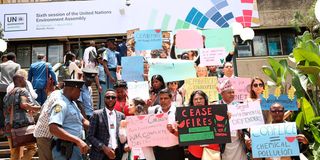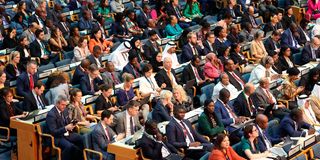UNEA meeting on climate change kicks off in Nairobi with focus on plastics

Delegates hold placards as they protest against war and environmental pollution during the sixth session of the United Nations Environment Assembly (UNEA-6) at the United Nations Environment Programme (UNEP) headquarters in Nairobi on February 26,2024.
What you need to know:
- It comes at a critical time when the world has three main inflection points to deal with, and only six years left to actualise the UN Sustainable Development Goals (SDGs).
- UNEA 6 President, Leila Benali, who is also the Minister for Energy Transition and Sustainable Development of Morocco, reiterated the need for countries to look at the existing crises as a way to put more actionable ambitions that can save our planet.
World leaders are in Nairobi to debate and make decisions on 19 pressing environmental issues at the world's largest environmental gathering.
The meeting, attended by more than 4,000 delegates from over 180 countries, is being hosted by the United Nations Environment Programme (Unep) at its headquarters in Gigiri.

Delegates attending the opening of the sixth session of the United Nations Environment Assembly (UNEA-6) at the United Nations Environment Programme (UNEP) headquarters in Nairobi on February 26,2024.
This year’s gathering will be the sixth session since the inception of the United Nations Environment Assembly (Unea 6) in the year 2012. It comes at a critical time when the world has three main inflection points to deal with, and only six years left to actualise the UN Sustainable Development Goals (SDGs).
The meeting has a special focus on using Multilateral Environment Agreements (MEAs) to help in tackling the same old triple planetary crises; climate change, nature and biodiversity as well as pollution and waste management.
UNEA 6 President, Leila Benali, who is also the Minister for Energy Transition and Sustainable Development of Morocco, reiterated the need for countries to look at the existing crises as a way to put more actionable ambitions that can save our planet.
“Inflection points such as war, elections and crises such as Covid-19 should make us come up with ambitious resolutions,” she said.
“Half of the world's population will be conducting their general elections this year, this means that the transitional governments or the existing ones may put aside key environmental issues derailing implementation,” she added.

United Nations Environment Assembly (UNEA) President Leila Benali delivering her speech to delegates during the opening session of the sixth session of the United Nations Environment Assembly (UNEA-6) at the United Nations Environment Programme (UNEP) headquarters in Nairobi on February 26, 2024.
Every two years, the world sets a global agenda on the overarching policy guidelines that address emerging environmental challenges.
Environment Cabinet Secretary, Soipan Tuya, said that this year’s assembly will ensure that there is renewed hope in tackling critical issues that affect the environment.
This is even as Kenya focuses on shifting from a linear waste management system into a circular economy.
Already, the country has passed the Sustainable Waste Management Act, 2022 that will guide the implementation of the shift towards a circular economy.
This is in line with the previous historic agreement of a draft resolution that was passed at Unea 5.2, whose aim is to have a legally binding agreement to end plastic pollution.
So far, there have been three Intergovernmental Negotiating Committees (INCs) that Unep’s executive director, Inger Andersen told the Nation that the drafts look promising, especially regarding single use plastic and ways to deal with legacy plastic once the draft is adopted.
Already, Kenya is implementing the National Landscape and Ecosystem Restoration Programme with an aim of planting about 15 billion trees to achieve a tree cover of 30 percent by 2032.

United Nations Environment Assembly (UNEA) President Leila Benali(left) and Environment Cabinet Secretary Soipan Tuya going through their mobile phones while attending the sixth session of the United Nations Environment Assembly (UNEA-6) at the United Nations Environment Programme (UNEP) headquarters in Nairobi on February 26, 2024.
According to the Kenya Institute Public for Policy and Research Analysis (Kippra) data, the country’s forest cover is about 8.8 percent, and we are yet to achieve the 10 percent target.
Even as politics take centre stage for this year’s assembly, Andersen says this should not be the focus because the impact of climate change affects everyone, regardless of their political inclination on issues affecting the planet.
Civil societies from organisations like Greenpeace Africa, Power Shift Africa and the Fossil Fuel Non-Proliferation treaty yesterday said there is no hope that this Unea will have a strong decision if they ignore a binding agreement that addresses the entire lifecycles of plastics from production to disposal.
They also call on member states to endorse and implement an international fossil fuel treaty to phase out fossil fuel production in a just transition manner and have countries adopt sustainable and renewable energy sources.
“Our planet is drowning in plastic, a crisis intricately linked to the fossil fuel industry. Member states are allowing fossil fuel interests to drive the treaty negotiations and water down its ambition. Ending the corporate addiction to plastic is an important part of moving away from fossil fuels, combating climate change, pollution and protecting communities," said Hellen Dena, project lead of the Pan-Africa Plastics Project at Greenpeace Africa.
Amos Wemanya, senior advisor for Renewable Energy and Just Transitions at Power shift Africa, underscored the need to urgently shift to renewable sources rather than use of fossil fuels.
"Fossil fuels are failing to power the African continent. Despite decades of coal, oil and gas extraction, 600 million Africans have been left without power. The era of fossil fuels must end now if we are to avert catastrophic climate change. We urge member states at Unea-6 to commit to a rapid and just transition to renewable energy,” he said.





